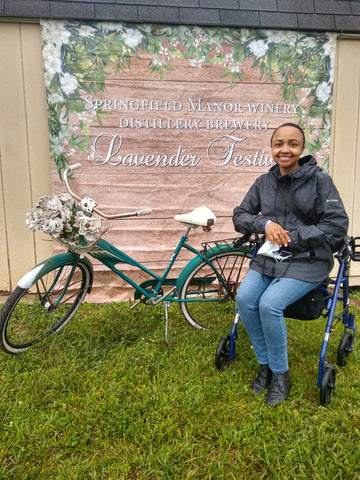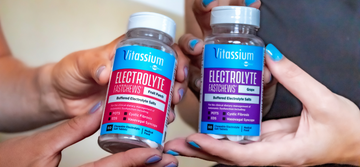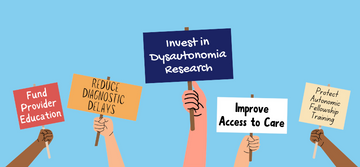
At Vitassium, we are committed to supporting people living with chronic illness, including sharing the stories of patients and their journeys through diagnosis and treatment.
You have to be your own champion. You are your best advocate. No one knows you like you do. Even when your body is down for the count, what’s left of your brain and whatever determination you can muster will be the difference between getting the care you desperately need and being dismissed.
I became a champion in a boxing match that started with me losing against an unfamiliar opponent. Nearly four years ago, I thought I heard a bell ringing in the middle of what became the biggest fight of my life. It seemed distant but …I could hear it and I knew what it meant. I was no longer on the ropes - I was knocked out. Suddenly after a lingering cold, insurmountable fatigue and fluctuating symptoms left me weary and punch-drunk. I couldn’t regulate my temperature, simultaneously hot and cold. Throughout the day I’d be hit with episodes of racing heartbeat, confusion, dizziness, and my legs would collapse at any moment. I knew something was wrong and it was not like anything else I’d experienced. In my mind, I heard that bell and the echo of the referee’s count.
At work and alone for the moment, I slumped over my treatment table trying to catch a minute of rest before my next patient. As I reflected on my day, I realized I couldn’t go on in this way. I had to stop working. There was no passion, purpose, or strength I could squeeze out of what was left of me. This wasn’t just burnout and I honestly wondered if I was dying.
I’d spent my entire life devoted to a career in medicine, pivoting on my path multiple times until I had the piece of paper, title and legal permission to help people heal. Most of the pivoting over the years was due to chronic illness. Before I was a practitioner, I was a patient.
I spent a lot of my life overcoming illness in one form or another since birth, and that’s not an exaggerated statement. After many childhood illnesses and injuries, I was diagnosed with a cardiac issue at age 17. Seventeen years later, these symptoms were something new. I was by no means naïve to the challenge I was about to face, and yet, I was infuriated because I would have to fight for me.
Chronic illness educated me in ways other practitioners weren’t. I know the fight is set before you enter the ring. For better or worse in Western medicine, diagnosis is erroneously recognized as the definition of legitimacy. Diagnostic delay, one of the biggest disparities in healthcare, is often due to institutional and provider bias (implicit or explicit), general ignorance, and lack of willingness to learn or listen. Therefore, the onus is on you, the patient. You must prove you’re ill, prove you’re sane, and prove you want to get better, especially if your symptoms don’t fit the definition of an easier diagnosis. There is the unspoken criteria to prove it’s worth the time and money it costs to be a patient with complex medical needs and prove you’re not lying for your own personal gain, like drug seeking or financial assistance.
I knew I wasn’t going to receive any reciprocity having “Dr.” in front of my name. It doesn't earn respect, nor give immunity to medical gaslighting in the treatment room or from peers. I was more likely to be ignored. I’m black, a woman, and already have several chronic conditions. I had to be my own champion and win.
Being my own best advocate, I put in the work and research I knew I would need in this fight. I recorded all of my symptoms daily - without this I knew nothing would be acknowledged by providers. I researched any condition that matched multiple symptoms and compared them until I had a short list. This time, I narrowed it down to one diagnosis. Bringing my records and research with me to the next appointment, I could put on my gloves and get back in the ring.
I educated my doctor, advocated for myself, and was later diagnosed with POTS or Postural Orthostatic Tachycardia Syndrome,a common autonomic disorder that impacts an estimated 1-3 million Americans. Patients are often misdiagnosed, with 83% of POTS patients given a psychological diagnosis prior to being diagnosed with POTS. Like myself, 25% of people with POTS cannot work, according to Dysautonomia International.
Through my self-advocacy I won and as a result, I could get the help I needed. When you have a chronic illness you also understand it’s not just one fight. You have to keep fighting. If that had not worked, I would’ve found another doctor, and another, and another until I was heard.
My recommendations if you find yourself on a similar journey of self-advocacy:
- Obtain a therapist, social worker, or counselor. It does get lonely, frustrating and you need someone to talk to. They can also help you navigate decisions and come up with solutions to help.
- Get a mobility aid if you need one. Don’t be afraid to use what you need to maintain your mobility and independence. Being able to get from A to B is more important than other people’s opinions or feeling stuck.
- Get an organizer to keep track of documentation. Start using a file organizer to keep all your documentation (lab results, notes, etc.) together along with your symptom journal and take it with you to appointments. If you have trouble keeping up with paper, there are diary apps to track your symptoms.
- Allow yourself permission to take a break. You’ve never done this day in your life before. It may be different from the ones that have come before it. Maybe not. Give yourself a break when things are difficult and don’t punish yourself.
Once diagnosed, you have to defend it to continue to get the care you deserve. No one knows you and your symptoms or condition like you do. Every day you fight and every day you must resolve to win. For anyone with chronic illness, there are no small wins. All progress is triumphant because the depths from which we revive ourselves every day are deeper than anyone else knows. You are a champion.
Kachina L. Smith, DAc, LAc, is an acupuncture physician, consultant, and advocate in the Washington DC metropolitan area.







